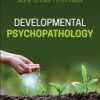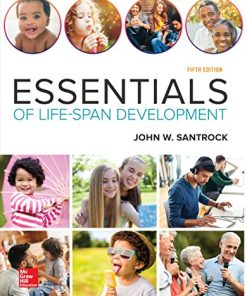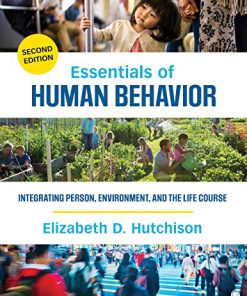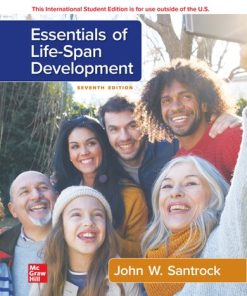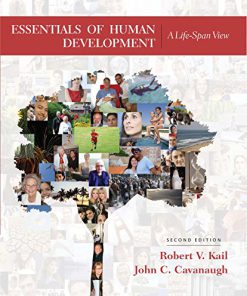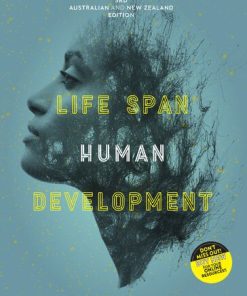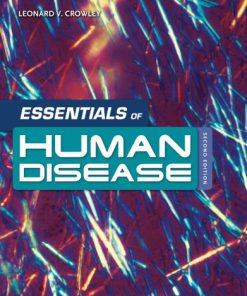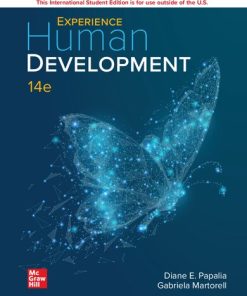(Ebook PDF) Life The Essentials of Human Development 2nd Edition by Gabriela Martorell 1264002823 9781264002825 full chapters
$50.00 Original price was: $50.00.$25.00Current price is: $25.00.
Life: The Essentials of Human Development 2nd Edition by Gabriela Martorell – Ebook PDF Instant Download/DeliveryISBN: 1264002823, 9781264002825
Full download Life: The Essentials of Human Development 2nd Edition after payment.
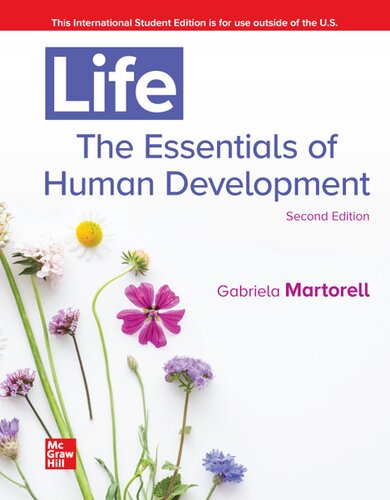
Product details:
ISBN-10 : 1264002823
ISBN-13 : 9781264002825
Author: Gabriela Martorell
Life: The Essentials of Human Development is a brief but thorough account of human development from conception to death with a deep integration of diverse cultural perspectives and research, and a focus on practical application. Written from a developmental framework and borrowing from multiple traditions and theoretical perspectives, Life: The Essentials of Human Development addresses the major periods of development and focuses on the important biological, psychological, and social forces driving change, highlighting theoretical distinctions, research findings, and new directions in the field.
Life: The Essentials of Human Development 2nd Table of contents:
Chapter 1: The Study of Human Development
Chapter 1 Introduction
Human Development: An Ever-Evolving Field
Studying the Life Span
The Study of Human Development: Basic Concepts
Domains of Development
Periods of the Life Span
Influences on Development
Heredity, Environment, and Maturation
Contexts of Development
Normative and Nonnormative Influences
Critical or Sensitive Periods
The Life-Span Developmental Approach
Summary and Key Terms
Human Development: An Ever-Evolving Field
The Study of Human Development: Basic Concepts
Influences on Development
The Life-Span Developmental Approach
Chapter 2: Theory and Research
Chapter 2 Introduction
Basic Theoretical Issues
Issue 1: Is Development Active or Reactive?
Issue 2: Is Development Continuous or Discontinuous?
Issue 3: Psychology is Weird
Theoretical Perspectives
Perspective 1: Psychoanalytic
Perspective 2: Learning
Perspective 3: Cognitive
Perspective 4: Contextual
Perspective 5: Evolutionary/Sociobiological
Research Methods
Quantitative and Qualitative Research
Sampling
Forms of Data Collection
Basic Research Designs
Developmental Research Designs
Ethics of Research
The Open Science Movement
Research with Human Participants
Summary and Key Terms
Basic Theoretical Issues
Theoretical Perspectives
Research Methods
Ethics of Research
Chapter 3: Forming a New Life
Chapter 3 Introduction
Conceiving New Life
Cultural Beliefs about Conception
Fertilization
Multiple Births
Mechanisms of Heredity
The Genetic Code
Sex Determination
Patterns of Genetic Transmission
Genetic and Chromosomal Abnormalities
Genetic Counseling and Testing
Nature and Nurture
Measuring Heritability
Interactions of Heredity and Environment
Prenatal Development
Cultural Beliefs about Prenatal Development
Stages of Prenatal Development
Maternal Influences
Paternal Influences
Monitoring and Promoting Prenatal Development
Disparities in Prenatal Care
Summary and Key Terms
Conceiving New Life
Mechanisms of Heredity
Nature and Nurture
Prenatal Development
Monitoring and Promoting Prenatal Development
Chapter 4: Birth and Physical Development during the First Three Years
Chapter 4 Introduction
Childbirth, Culture, and Change
The Birth Process
Stages of Childbirth
Electronic Fetal Monitoring
Vaginal versus Cesarean Delivery
Medicated versus Nonmedicated Delivery
Doulas
Childbirth and the Covid-19 Pandemic
The Newborn Baby
Size and Appearance
Medical and Behavioral Assessment
States of Arousal
Complications of Childbirth
Low Birth Weight
Postmaturity
Stillbirth
Survival and Health
Reducing Infant Mortality
Immunizations
Early Physical Development
Principles of Development
Physical Growth
Nutrition
Building the Brain
Early Sensory Capacities
Motor Development
Milestones of Motor Development
Ethnic and Cultural Influences
Motor Development and Perception
The Ecological Theory of Perception
Dynamic Systems Theory
Summary and Key Terms
Childbirth, Culture, and Change
The Birth Process
The Newborn Baby
Complications of Childbirth
Survival and Health
Early Physical Development
Motor Development
Chapter 5: Cognitive Development during the First Three Years
Chapter 5 Introduction
Cognitive Development: Six Approaches
Behaviorist Approach
Classical and Operant Conditioning
Research Applications
Psychometric Approach
Testing Infants and Toddlers
Assessing the Early Home Environment
Early Intervention
Piagetian Approach
Substages of the Sensorimotor Stage
Imitation
Object Concept
Symbolic Development
Scale Error
Evaluating Piaget’s Sensorimotor Stage
Information-Processing Approach
Habituation
Tools of Infant Research
Perceptual and Attentional Processes
Cross-Modal Transfer
Information Processing as a Predictor of Intelligence
Information Processing and Piagetian Abilities
Evaluating Information-Processing Research
Cognitive Neuroscience Approach
Social-Contextual Approach
Language Development
Classic Theories of Language Acquisition
Early Language Development
Characteristics of Early Speech
Variations in Language Development
Influences on Early Language Development
Summary and Key Terms
Cognitive Development: Six Approaches
Behaviorist Approach
Psychometric Approach
Piagetian Approach
Information-Processing Approach
Cognitive Neuroscience Approach
Social-Contextual Approach
Language Development
Chapter 6: Psychosocial Development during the First Three Years
Chapter 6 Introduction
Foundations of Psychosocial Development
Emotions
Temperament
Early Social Experience: The Family
Gender
Developmental Issues in Infancy
Developing Trust
Developing Attachments
Mutual Regulation
Social Referencing
Developmental Issues in Toddlerhood
The Emerging Sense of Self
Development of Autonomy
Socialization Processes
Peer Influences
Siblings
Peers
Maternal Employment and Child Care
Effects of Maternal Employment
Early Child Care
Maltreatment: Abuse and Neglect
Maltreatment in Infancy and Toddlerhood
Ecological Perspective on Abuse
Long-Term Effects of Maltreatment
Summary and Key Terms
Foundations of Psychosocial Development
Developmental Issues in Infancy
Developmental Issues in Toddlerhood
Peer Influences
Maternal Employment and Child Care
Maltreatment: Abuse and Neglect
Chapter 7: Physical and Cognitive Development in Early Childhood
Chapter 7 Introduction
Physical Development
Body Growth and Change
Sleep
Brain Development
Motor Skills
Health and Safety
Obesity and Overweight
Undernutrition
Allergies
Deaths and Accidental Injuries
Environmental Influences on Health
Cognitive Development: Piagetian Approach
Advances of Preoperational Thought
Immature Aspects of Preoperational Thought
Theory of Mind
Media and Cognition
Memory Development: Information-Processing Approach
Basic Processes and Capacities
Childhood Memories
Intelligence: Psychometric and Vygotskian Approaches
Psychometric Measures
Influences on Measured Intelligence
Testing and Teaching Based on Vygotsky’s Theory
Language Development
Vocabulary
Grammar and Syntax
Pragmatics and Social Speech
Private Speech
Speech and Language Delays
Emergent Literacy
Early Childhood Education
Preschool
Kindergarten
Summary and Key Terms
Physical Development
Health and Safety
Cognitive Development: Piagetian Approach
Memory Development: Information-Processing Approach
Intelligence: Psychometric and Vygotskian Approaches
Language Development
Early Childhood Education
Chapter 8: Psychosocial Development in Early Childhood
Chapter 8 Introduction
The Developing Self
The Self-Concept
Self-Esteem
Emotional Development
Erikson: Initiative versus Guilt
Gender
Gender Differences
Perspectives on Gender Development
Play
Cognitive Levels of Play
The Social Dimension of Play
Gender Differences in Play
Cultural Influences on Play
Parenting
Forms of Discipline
Parenting Styles
Relationships with Other Children
Sibling Relationships
The Only Child
Playmates and Friends
Summary and Key Terms
The Developing Self
Gender
Play
Parenting
Relationships with Other Children
Chapter 9: Physical and Cognitive Development in Middle Childhood
Chapter 9 Introduction
Physical Development
Height and Weight
Brain Development
Health, Fitness, and Safety
Sleep
Nutrition
Physical Activity
Obesity and Overweight
Other Medical Conditions
Accidental Injuries
Cognitive Development: Piagetian Approach
Cognitive Advances
Cultural Influences on Piagetian Task Performance
Information-Processing Approach
Executive Functioning
Selective Attention
Working Memory
Mnemonic Strategies
Metamemory
Psychometric Approach
The IQ Controversy
Influences on IQ
Specific Intelligence Factors
Other Intelligence Tests
Language and Literacy
Vocabulary, Grammar, and Syntax
Pragmatics
Second-Language Learning
Literacy
The Child in School
Influences on School Achievement
Educating Children with Special Needs
Children with Learning Difficulties
Gifted Children
Summary and Key Terms
Physical Development
Health, Fitness, and Safety
Cognitive Development: Piagetian Approach
Information-Processing Approach
Psychometric Approach
Language and Literacy
The Child in School
Educating Children with Special Needs
Chapter 10: Psychosocial Development in Middle Childhood
Chapter 10 Introduction
The Developing Self
Self-Concept Development
Industry versus Inferiority
Emotional Development
Family Influences
Family Atmosphere
Family Structure
Sibling Relationships
Peer Influences
Positive and Negative Peer Influences
Gender and Peer Groups
Friendship
Popularity
Aggression
Mental Health
Resilience
Summary and Key Terms
The Developing Self
Family Influences
Peer Influences
Mental Health
Chapter 11: Physical and Cognitive Development in Adolescence
Chapter 11 Introduction
Adolescence as a Social Construction
Physical Development in Puberty
Hormonal Changes in Puberty
Puberty and Sexual Maturity
Pubertal Timing
The Adolescent Brain
Physical and Mental Health
Physical Activity
Sleep
Nutrition and Eating Disorders
Substance Abuse
Depression
Death in Adolescence
Aspects of Cognitive Maturation
Formal Operations
Language Development
Moral Development and Prosocial Behavior
Educational and Vocational Issues
Influences on School Achievement
Dropping Out of High School
Other Vocational Issues
Summary and Key Terms
Adolescence as a Social Construction
Physical Development in Puberty
The Adolescent Brain
Physical and Mental Health
Aspects of Cognitive Maturation
Educational and Vocational Issues
Chapter 12: Psychosocial Development in Adolescence
Chapter 12 Introduction
The Search for Identity
Psychosocial Theory
Identity Status
Racial and Ethnic Influences on Identity Formation
Gender Differences in Identity Formation
Identity Development in Sexual-Minority Youth
Sexuality
Sexual Behavior
Sexual Orientation
Sexual and Gender Risks
Relationships
Adolescents and Parents
Sibling Relationships
Peer Relationships
Relationship Risks
Antisocial Behavior and Juvenile Delinquency
Biological Influences
Environmental Influences
Preventing and Treating Delinquency
Summary and Key Terms
The Search for Identity
Sexuality
Relationships
Antisocial Behavior and Juvenile Delinquency
Chapter 13: Physical and Cognitive Development in Emerging and Young Adulthood
Chapter 13 Introduction
Emerging Adulthood
Physical Health and Fitness
Health Status
Genetic Influences on Health
Behavioral Influences on Health
Indirect Influences on Health
Mental Health Problems
Sexual and Reproductive Issues
Sexual Behavior and Attitudes
Sexually Transmitted Infections
Menstrual Disorders
Infertility
Perspectives on Adult Cognition
Piagetian Approaches
Triarchic Theory of Intelligence
Emotional Intelligence
Moral Reasoning
Kohlberg’s Theory of Moral Development
The Three Ethics
Education and Work
College
Work
Summary and Key Terms
Emerging Adulthood
Physical Health and Fitness
Sexual and Reproductive Issues
Perspectives on Adult Cognition
Moral Reasoning
Education and Work
Chapter 14: Psychosocial Development in Emerging and Young Adulthood
Chapter 14 Introduction
Developmental Tasks of Emerging Adulthood
Paths to Adulthood
Identity Development
Models of Personality Development
Normative-Stage Models
Timing-of-Events Model
Trait Models
Typological Models
Relationships in Emerging Adulthood
Relationships with Parents
Friendship
Love
Marital and Nonmarital Lifestyles
Single Life
Cohabitation
Marriage
Parenthood
Cultural and Contextual Influences
Relationship Dynamics
Dual-Income Families
When Marriage Ends
Divorce
Remarriage and Stepparenthood
Summary and Key Terms
Developmental Tasks of Emerging Adulthood
Models of Personality Development
Relationships in Emerging Adulthood
Marital and Nonmarital Lifestyles
Parenthood
When Marriage Ends
Chapter 15: Physical and Cognitive Development in Middle Adulthood
Chapter 15 Introduction
Middle Age: A Social Construct
Physical Changes
Sensory Functioning
Physical Fitness
The Brain at Midlife
Structural and Systemic Changes
Sexuality and Reproductive Functioning
Physical and Mental Health
Physical Health at Midlife
Behavioral Influences on Health
Socioeconomic Status and Health
Race/Ethnicity and Health
Gender and Health
Mental Health at Midlife
Stress at Midlife
Cognitive Performance
Cognitive Performance at Midlife
Fluid and Crystallized Intelligence
Adult Cognition
Expertise
Creativity
Work and Education
Work and Retirement
Work and Cognitive Development
Adult Education and Work Skills
Summary and Key Terms
Middle Age: A Social Construct
Physical Changes
Physical and Mental Health
Cognitive Performance
Adult Cognition
Work and Education
Chapter 16: Psychosocial Development in Middle Adulthood
Chapter 16 Introduction
Change at Midlife
Psychosocial Theory and Midlife
Generativity versus Stagnation
Issues and Themes
Timing of Events
The Midlife Crisis
Identity Development
Change and Stability in Midlife
Trait Models of Personality
Positive Mental Health at Midlife
Relationships at Midlife
Theories of Social Contact
Consensual Relationships
Marriage
Cohabitation
Divorce
Friendships
Relationships with Maturing Children
Adolescent Children
The Empty Nest
Adult Children
Voluntary Childlessness
Other Kinship Ties
Relationships with Aging Parents
Relationships with Siblings
Grandparenthood
Summary and Key Terms
Change at Midlife
Psychosocial Theory and Midlife
Issues and Themes
Change and Stability in Midlife
Positive Mental Health at Midlife
Relationships at Midlife
Consensual Relationships
Relationships with Maturing Children
Other Kinship Ties
Chapter 17: Physical and Cognitive Development in Late Adulthood
Chapter 17 Introduction
Old Age Today
The Graying of the Population
Conceptualizations of Aging
Physical Aging and Longevity
Life Expectancy
Theories of Aging
Extending the Life Span
Physical Changes
Organic and Systemic Changes
The Aging Brain
Sensory and Psychomotor Functioning
Sleep
Sexual Functioning
Physical and Mental Health
Health Status
Chronic Conditions and Disabilities
Lifestyle Influences on Health and Longevity
Mental and Behavioral Problems
Cognitive Changes
Intelligence and Processing Abilities
Memory
Wisdom
Summary and Key Terms
Old Age Today
Physical Aging and Longevity
Physical Changes
Physical and Mental Health
Cognitive Changes
Chapter 18: Psychosocial Development in Late Adulthood
Chapter 18 Introduction
Personality Development in Late Adulthood
Ego Integrity versus Despair
Personality Traits in Old Age
Well-Being in Late Adulthood
Well-Being in Sexual Minorities
The Effect of Religion and Spirituality on Well-Being
Coping and Mental Health
Models of Successful Aging
Practical and Social Issues Related to Aging
Work and Retirement
Financial Concerns
Living Arrangements
Elder Abuse
Personal Relationships in Late Life
Theories of Social Contact and Social Support
Relationships and Health
The Multigenerational Family and Cultural Differences
Marital Relationships
Marriage
LGBTQ+ Relationships
Widowhood
Divorce and Remarriage
Nonmarital Lifestyles and Relationships
Single Life
Cohabitation
Friendships
Nonmarital Kinship Ties
Relationships with Adult Children
Relationships with Siblings
Summary and Key Terms
Personality Development in Late Adulthood
Well-Being in Late Adulthood
Practical and Social Issues Related to Aging
Personal Relationships in Late Life
Marital Relationships
Nonmarital Lifestyles and Relationships
Nonmarital Kinship Ties
Chapter 19: Dealing with Death and Bereavement
Chapter 19 Introduction
The Meaning of Death and Dying
The Cultural Context
The Mortality Revolution
Facing Death and Loss
Factors Preceding Death
Confronting Death
Patterns of Grieving
Responses to Death Across the Life Span
Significant Losses
Surviving a Spouse
Losing a Parent in Adulthood
Losing a Child
Mourning a Miscarriage
Medical, Legal, and Ethical Issues
Suicide
Hastening Death
Finding Meaning and Purpose in Life and Death
Life Review
Development: A Lifelong Process
Summary and Key Terms
The Meaning of Death and Dying
Facing Death and Loss
Significant Losses
Medical, Legal, and Ethical Issues
Finding Meaning and Purpose in Life and Death
People also search for Life: The Essentials of Human Development 2nd:
life the essentials of human development pdf
borrow life the essentials of human development
life the essentials of human development 2nd edition pdf
life the essentials of human development second edition
5 major principles of human development
Tags:
Life,The Essentials,Human Development,Gabriela Martorell
You may also like…
Politics & Philosophy - Social Sciences
Social Science
Essentials of Life Span Development 5th Edition, (Ebook PDF)
Uncategorized
Uncategorized
Uncategorized
Politics & Philosophy - Social Sciences
Uncategorized
Children's Books - Education & Reference
Looseleaf for Experience Human Development 14th Edition Gabriela Martorell


